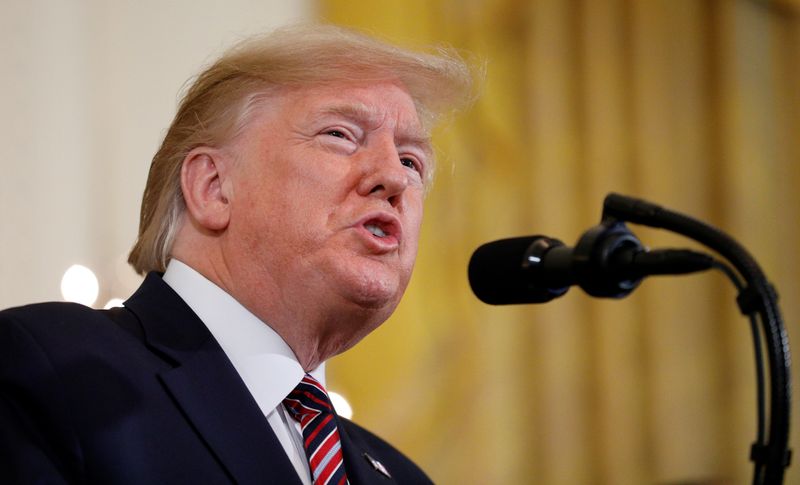By Jeff Mason, David Lawder and Andrea Shalal
WASHINGTON (Reuters) - U.S. President Donald Trump is expected to meet with top trade advisers on Thursday to discuss planned Dec. 15 tariffs on some $160 billion in Chinese goods, three sources familiar with the plans said, as markets braced for potential negative impacts.
Officials circulated talking points downplaying the repercussions such a tariff hike would have on the U.S. economy ahead of Trump's meeting with Trade Representative Robert Lighthizer, Treasury Secretary Steven Mnuchin, and White House advisers Larry Kudlow and Peter Navarro.
The senior trade advisers are expected to present divergent views during the high-stakes meeting, but the final decision will be up to Trump, the sources said.
A decision to move ahead with the December tariffs could roil financial markets and scuttle U.S.-China talks to end the 17-month-long trade war between the world's two largest economies for the remainder of Trump's term.
Negotiations have failed to produce deals on agricultural purchases by China and tariff rollbacks by the United States since the two countries agreed in October to conclude a preliminary trade agreement.
Many had expected the two sides to reach a deal ahead of the Dec. 15 tariffs, but that prospect now appeared unlikely, according to multiple U.S. and Chinese sources. The question now is whether Washington will delay the tariffs or let them take effect.
"I'm expecting them to raise the tariffs on Sunday," one source said. "The administration is preparing its talking points about how that's the right thing to do. The message is that it will not be painful."
Emails had been circulated among a small group of senior officials in recent days, arguing that previous tariffs had a muted impact on the U.S. economy, a separate source familiar with the administration's thinking said.
Navarro, a China hawk, this week circulated a separate memo in favor of continued tariffs, arguing that China had increased its purchases of U.S. pork and soybeans solely because of its domestic swine fever outbreak, and that tariffs were not having a negative effect on U.S. growth or the stock market.
The Navarro-penned document and separate memos said tariffs imposed by the Trump administration on China over the past year-and-a-half had not been as devastating as critics had argued, a view not shared by many economists.
"The message is that it will not be painful," said the one source familiar with the administration's thinking. "People have been proclaiming for a year and half that the sky is falling, and the sky isn't falling yet."
Trump's advisers are divided about whether to proceed with the Dec. 15 tariffs and what impact such a move would have on U.S. financial markets, one source familiar with White House trade deal negotiating procedures said.
"When they get in the room, Peter's going to say: 'Hit 'em.' Larry [Kudlow] and Mnuchin are going to say: 'Don't do it.' And I think Bob [Lighthizer] ... is hoping he has enough to go on to justify not doing it," the source said.

Derek Scissors, a China scholar at the American Enterprise Institute who consults with some White House officials, said he believed the likeliest scenario is a delay in the Dec. 15 tariff deadline for up to 90 days.